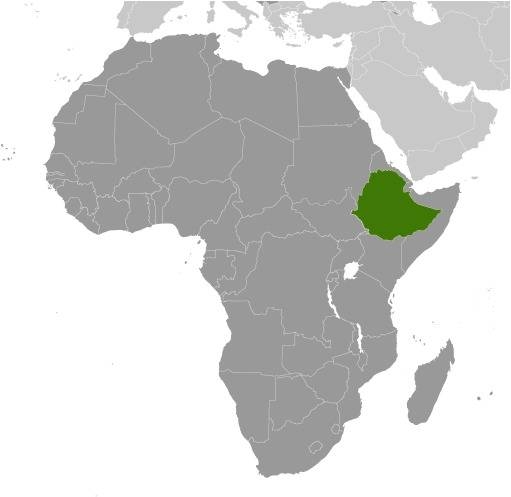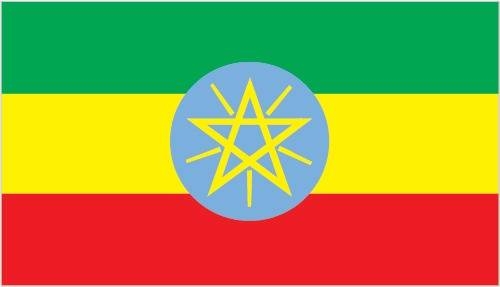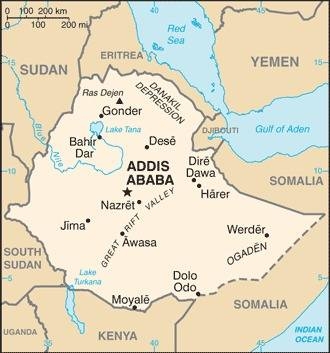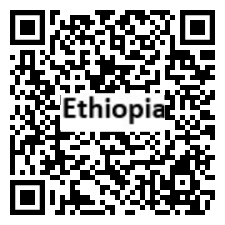Country Summary




Introduction
Background
Unique among African countries, the ancient Ethiopian monarchy maintained its freedom from colonial rule with the exception of a short-lived Italian occupation from 1936-41.
Geography
Area
total: 1,104,300 sq km
land: 1,096,570 sq km
water: 7,730 sq km
Climate
tropical monsoon with wide topographic-induced variation
Natural resources
small reserves of gold, platinum, copper, potash, natural gas, hydropower
People and Society
Population
113,656,596 (2022 est.)
Ethnic groups
Oromo 35.8%, Amhara 24.1%, Somali 7.2%, Tigray 5.7%, Sidama 4.1%, Guragie 2.6%, Welaita 2.3%, Afar 2.2%, Silte 1.3%, Kefficho 1.2%, other 13.5% (2022 est.)
Languages
Oromo (official working language in the State of Oromiya) 33.8%, Amharic (official national language) 29.3%, Somali (official working language of the State of Sumale) 6.2%, Tigrigna (Tigrinya) (official working language of the State of Tigray) 5.9%, Sidamo 4%, Wolaytta 2.2%, Gurage 2%, Afar (official working language of the State of Afar) 1.7%, Hadiyya 1.7%, Gamo 1.5%, Gedeo 1.3%, Opuuo 1.2%, Kafa 1.1%, other 8.1%, English (major foreign language taught in schools), Arabic (2007 est.)
Religions
Ethiopian Orthodox 43.8%, Muslim 31.3%, Protestant 22.8%, Catholic 0.7%, traditional 0.6%, other 0.8% (2016 est.)
Population growth rate
2.46% (2022 est.)
Government
Government type
federal parliamentary republic
Capital
name: Addis Ababa
Executive branch
chief of state: President SAHLE-WORK Zewde (since 25 October 2018)
head of government: Prime Minister ABIY Ahmed Ali (since April 2018); Deputy Prime Minister DEMEKE Mekonnen Hassen (since 29 November 2012)
Legislative branch
description: bicameral Parliament consists of:
House of Federation or Yefedereshein Mikir Bete (153 seats maximum; 144 seats current; members indirectly elected by state assemblies to serve 5-year terms)
House of People's Representatives or Yehizb Tewokayoch Mekir Bete (547 seats maximum; 470 seats current; members directly elected in single-seat constituencies by simple majority vote; 22 seats reserved for minorities; all members serve 5-year terms)
Economy
Economic overview
growing Horn of Africa construction- and services-based economy; port access via Djibouti and Eritrea; widespread but declining poverty; COVID-19, locust invasion, and Tigray crisis disruptions; public investment increases; second largest African labor force
Real GDP (purchasing power parity)
$264.05 billion (2020 est.)
Real GDP per capita
$2,300 (2020 est.)
Agricultural products
maize, cereals, wheat, sorghum, milk, barley, sweet potatoes, roots/tubers nes, sugar cane, millet
Industries
food processing, beverages, textiles, leather, garments, chemicals, metals processing, cement
Exports
$7.62 billion (2018 est.)
Exports - partners
China 17%, United States 16%, United Arab Emirates 8%, Saudi Arabia 6%, South Korea 5%, Germany 5% (2019)
Exports - commodities
coffee, sesame seeds, gold, cut flowers, zinc (2019)
Imports
$19.93 billion (2018 est.)
Imports - partners
China 27%, India 9%, United Arab Emirates 9%, France 9%, United Kingdom 7% (2019)
Imports - commodities
aircraft, gas turbines, packaged medicines, electric filament, cars (2019)
Exchange rates
birr (ETB) per US dollar -
Page last updated: Thursday, July 28, 2022
